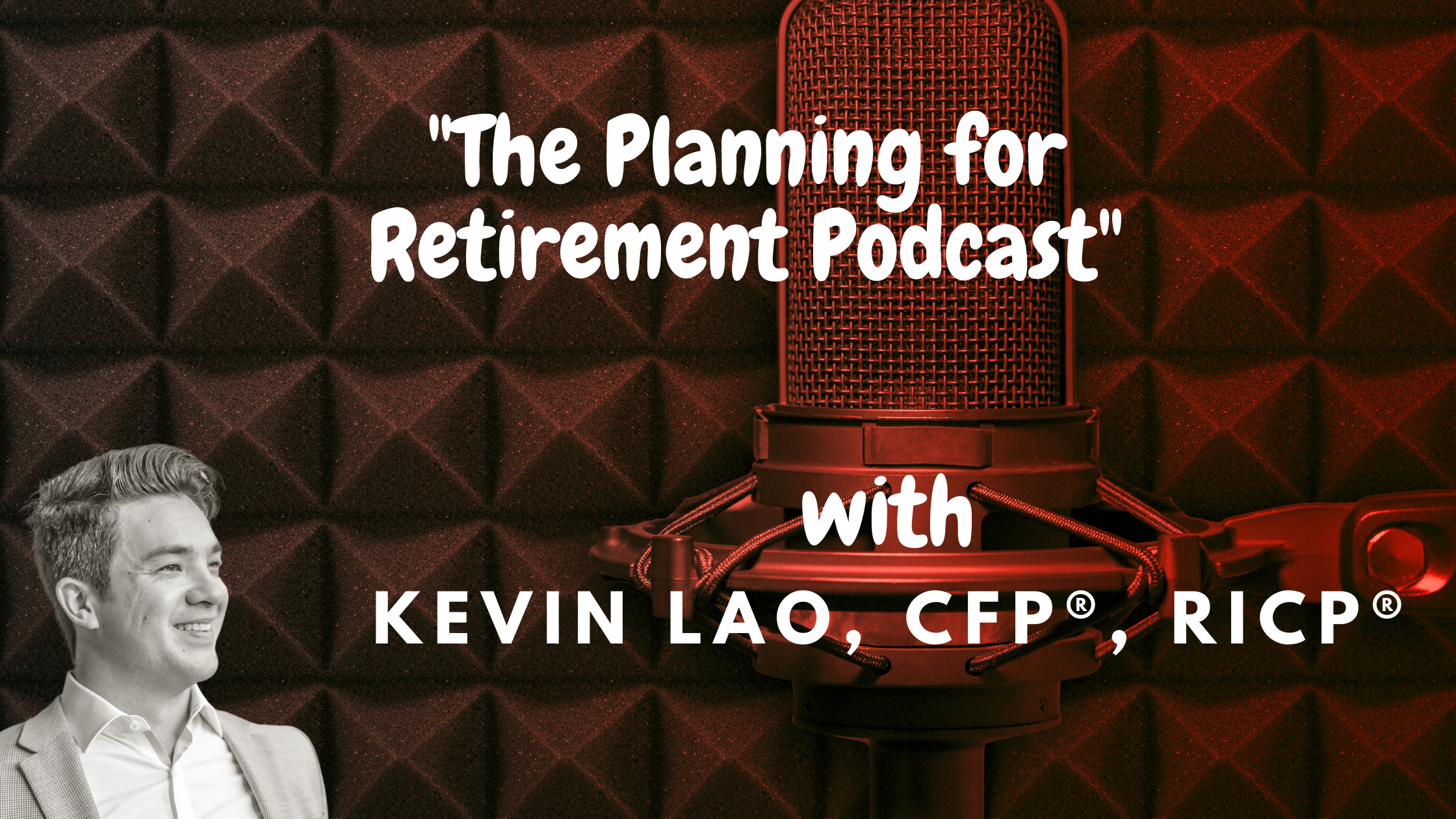5 Reasons To Own Life Insurance In Retirement
"Should I own life insurance in retirement?"
Your kids might be financially independent, your mortgage is close to being paid off, and you are getting close to having what you need to retire comfortably. You might be wondering, “Should I own life insurance in retirement?” So, before you go and cancel that policy, read this post and see if you would be a good candidate to own some amount of life insurance for the long haul.
Basics of term and permanent insurance

Before we dive in, let’s go over the basics of the two primary types of life insurance. Term Insurance is just that, it’s for a specified term. This is a cost-effective solution for a temporary need. Let’s say you have young children, a mortgage, and another 20 years of earned income until retirement. The death benefit you will need, on average, will be at least 10-16x your gross income (according to the CFP board). So, if your income is $200,000/year, you will need approximately $2mm-$3.2mm of life insurance.
Depending on your health, this will only cost you pennies on the dollar (perhaps $1800-$3200/year). The reason it’s so cost effective is that only 1% of term policies ever pay a death claim, so term insurance is one of the most profitable products an insurance company can sell!
Permanent Insurance is of course, permanent (mind blown). There are many flavors out there; whole life (traditional), universal life, variable life, variable universal life, joint survivor universal life, and indexed universal life, to name a few. If you see the term variable, this means the policy performance is going to be tied to an underlying sub account that can be invested, like your 401k plan. If you don’t see the term variable, this means the performance is going to be tied to the performance of the insurance company’s general account, which is quite conservative. If you see indexed, this has a component of a fixed rate with potential upside of a targeted index, like the S&P 500. The difference between universal and traditional whole life is essentially the cost of insurance schedule. With traditional whole life, you have a fixed cost schedule at the time you start the policy, and it stays that way for the life of the plan. With universal, the cost of insurance goes up each year as you get older, but the premiums don’t necessarily go up each year. The schedule is flexible in that you can stop paying premiums one year (assuming you have enough cash value to support it), start again the next, pay half the premium another year and double the premium the year after. If you attempted this with traditional whole life, your policy would get cancelled, so don’t do that. I’m also not advocating you make premium payments to a universal policy like so, but it’s nice to have some flexibility.
I just want to emphasize how important it is, if you have a universal life policy, to review the performance at least annually. You can request an in-force illustration at any time to show how your policy has performed, and how it’s expected to perform based on fresh assumptions. I can’t tell you how many times I’ve looked at universal policies that people have paid into for decades that are on the verge of breaking.
The common theme for all permanent policies, if they are structured properly, is the death benefit should be in force for as long as you live. Additionally, there is a cash value component that you can access while you are living. This can be done through policy loans or partial surrenders.
So you might be wondering, why wouldn’t everyone buy permanent insurance and skip the term? The answer is simple, the premiums can range from 5-15 times more expensive! For this post, I will mainly discuss the argument of simply owning life insurance in retirement, whether it’s term or permanent is not the point. However, there are certain arguments I will make that ONLY permanent insurance can solve for. This is why it’s critical to begin with the end in mind and work backwards.
Reason #1: You are over the estate tax exemption limits (federal and/or state)
Currently, the federal estate exemption is $12.06mm/person (or $24.12mm for married couples). If your total estate is valued above the threshold and you die in 2022, you will pay tax on the amount ABOVE the threshold. The tax rates range from 18%-40%, depending on the size of your estate. Let’s say you had a total estate of $30mm and were married in 2022. If both you and your spouse passed away today under the current law, you would pay taxes on $5,880,000 at the federal level. There are also 17 states that have a “death tax,” so be careful where you live when you die as you might owe state AND federal estate taxes (and by “you,” I mean your beneficiaries)! For example, Massachusetts and Oregon tax estates in excess of $1mm! As you can see, living in an estate tax friendly state is a big decision point for many retirees.
This can become problematic for your heirs to pay these large sums of taxes. If you own a closely held business, a real estate portfolio, or a mix of stocks and bonds, you probably want your heirs to continue to enjoy the fruits of your labor and preserve those assets. Well, if your beneficiaries owe a seven figure tax bill, they might be forced to sell an extremely valuable asset in order to pay the taxes. This is where permanent life insurance can come into play. Life Insurance is a tax free payment of cash to your designated beneficiary. Therefore, instead of forcing your beneficiaries to sell that valuable asset, the life insurance death benefit could be used to pay the estate tax bill.
*The Tax Cuts and Jobs Act will sunset after the year 2025. The federal exemption is scheduled to revert back to the $5mm/person limit (plus some inflation adjustments). So, while you may not exceed the federal thresholds today, you certainly could exceed them in a few short years. Plan accordingly!
Reason #2: You Have a Dependent with Special Needs
Children with special needs often require permanent financial assistance. Meaning, their condition won’t make their life any easier as they get older. In fact, quite the opposite. The government provides some financial assistance for those they deem disabled in the form of Social Security Income, Medicare and Medicaid. However, you will likely want to provide additional financial support above and beyond the government assistance. While you are alive and working, you will do anything you can to provide that additional financial support. However, if something were to happen to you, how do you address that financial shortfall?
Owning a life insurance policy is a great solution to this problem. You can simply calculate the amount of annual income needed to support the beneficiary with special needs, and come up with an appropriate amount of life insurance to pay out to that beneficiary. These policies are often owned inside of what is called a Special Needs Trust. This special type of trust allows for the preservation of government support for the child, while at the same time receiving supplemental income from the trust. The longer you live, and the more assets you accumulate, might impact the amount of insurance that you need to own. Ideally you will want some amount of the insurance to be term and some permanent to accommodate the future accumulation of other assets.
Reason #3: To Replace Lost Retirement Income

You might be thinking life insurance is there to replace income when you are working, but how does it factor into retirement income? For starters, Social Security represents the largest pension fund in the world, and most retirees rely on it for some or most of their income in retirement. When one spouse dies, there is an automatic loss in Social Security income. The surviving spouse will elect to keep their own benefit, or the deceased’s benefit, whichever is higher. If a couple each had $24,000/year in social security benefits, this would result in $24,000/year in lost social security income upon the first spouse passing away. Additionally, after two tax years of filing as a qualifying widower, there could be a widow’s tax given they will have to transition over to a single filer, and potentially pay higher tax rates.
Furthermore, you might receive a pension from the military or government, or perhaps VA Disability income. The benefit might be cut in half, or even go to zero upon the annuitant passing away. Therefore, owning a life insurance policy through retirement can help replace lost social security or other pension income, making the surviving spouse whole and protecting their own longevity.
Reason #4: To Replenish Lost Assets from Long-term Care Costs
It’s estimated that medical costs in retirement will total about $300k for a couple that is 65 years old today, and that excludes Long-term care costs. The average cost of a nursing home in the US is north of $100k/year (in today’s dollars). If there was a need for long-term care at the end of the first spouse’s life, this could create a significant drain on retirement assets. This is especially true if the assets that were used to pay for long-term care came from retirement plans such as traditional IRAs or 401k plans, given the tax drag on withdrawals. Therefore, owning a life insurance policy can guarantee a cash infusion for the surviving spouse to protect their retirement lifestyle and their own longevity going forward. This could also be achieved with a life insurance policy with a Long-term care rider, which would allow funds from the policy to be paid in advance for long-term care costs, instead of waiting for the death benefit of the first spouse. Either way, utilizing some form of permanent life insurance in retirement is a great way to protect and/or replenish assets in the event long-term care becomes a financial drain.
Reason #5: To Guarantee a Financial Legacy
I often times hear from clients they have a strong desire to leave assets to their children, grandchildren or even their favorite charity. Ultimately what they are saying is they don’t want to burn through the assets they have accumulated, but they still want to ENJOY their retirement! These clients often times have a very difficult time spending their own money in retirement simply because of the fear of running out of money and being a burden on their loved ones. My clients that own permanent life insurance in retirement can sleep extremely well at night knowing that at least one asset is guaranteed to be there upon their death. This ends up liberating the client to spend more freely on travel, bucket list activities, charitable giving, and overall results in a more enjoyable retirement lifestyle.
BONUS Reason #6 – Owning Permanent Life Insurance in Retirement as a Fixed Income Alternative
Here is a fun concept, especially in light of today’s bond market! With the bond index down double digits year to date, many clients are asking about an alternative to bonds. A few come to mind including an individual bond ladder, fixed income annuities, or even a zero duration hedge strategy. However, the cash value in a traditional universal life or permanent life insurance policy can be extremely powerful, if structured properly. If you google “cash value life insurance,” you will see a mix bag of opinions. For the right client profile (maxing out qualified plans, maxing out Roth conversions, higher tax bracket etc.), there could be a very compelling argument to begin accumulating dollars within a permanent life insurance policy well before retirement. For starters, it will solve for all of the primary challenges we mentioned previously. Additionally, it will allow time for cash value to build up inside of the policy. If it’s structured properly, it can become a liquid asset to draw from during your retirement years.
You will likely experience anywhere from 4-6 bear markets during your retirement years. You’ve probably heard the concept, “buy low, sell high.” In retirement, this involves avoiding selling a depreciated asset for income. In a market like 2022, both stocks and bonds are down. If you have cash values built up in a fixed life insurance policy, it’s a viable hedge to allow your riskier assets to fully recover when the market turns around.
A few last words of advice
Life insurance does get more expensive as you get older, and you also have a greater risk of developing a medical condition that might make life insurance unobtainable. There is no one size fits all when it comes to retirement planning, especially when it comes to using life insurance in your retirement plan. The life insurance industry is quite complex with many carriers and many variations of permanent life insurance. Therefore, I highly recommend you consult with a fee-only financial planner who has expertise in this arena, like our firm! (Yes, I’m quite biased).
If you are interested in learning more about working with our firm, or would like to discuss your financial objectives, book a Mutual Fit meeting with the link below. Also, feel free to share this article with anyone that might find it useful.



